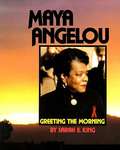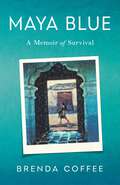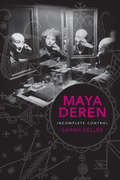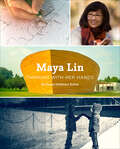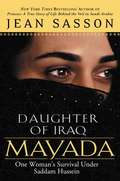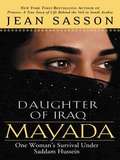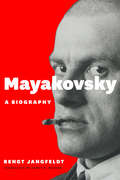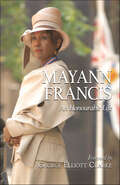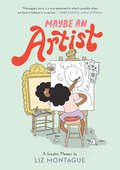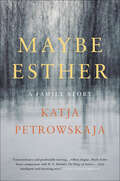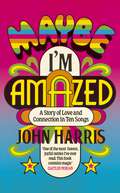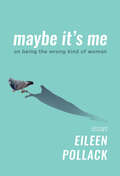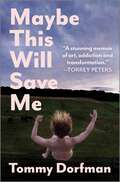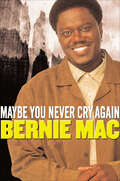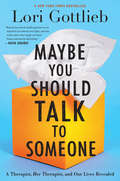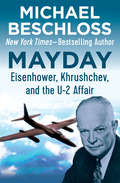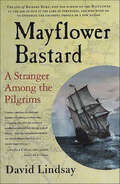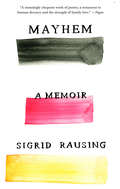- Table View
- List View
Maya Angelou: Greeting the Morning
by Sarah E. KingExamines the life of the African-American poet, from her childhood in the segregated South to her rise to prominence as a writer.
Maya Blue: A Memoir of Survival
by Brenda CoffeeFor fans of Breaking Bad and Narcos, a searingly honest and unforgettable memoir that challenges women to rethink everything they know about survival, resilience, and finding their voice.At twenty-one, Brenda Coffee surrendered herself to her marriage and became a woman who would do almost anything her charismatic and powerful older husband, Philip Ray, wanted. Regardless of whether it was dangerous, adventurous, sexual, or illegal, she wanted to be the one woman he couldn&’t live without. Brenda and Philip&’s life together was a fairy tale until it wasn&’t. Until Philip, the founder of two high-profile, groundbreaking public companies, began making real cocaine in their basement and became addicted. Until the Big Six tobacco companies threatened their lives for creating the first smokeless cigarette—Brenda coined the terms vape and vaping—and brutal Guatemalan military commandos forced her into the jungle at gunpoint. A suspenseful, fast-paced memoir that reads like a thriller, Maya Blue will strike a chord with those who&’ve lost their voice or had trouble finding their power. It will resonate with those who live with an addict or have grieved the loss of a spouse. But above all, it is an inspiring reminder that as long as you never surrender your voice and always keep your wits about you, you can survive almost anything.
Maya Deren
by Sarah KellerAssesses both the filmmaker's completed work and her numerous unfinished projects, arguing Deren's overarching aesthetic is founded on principles of incompletion, contingency, and openness
Maya Deren: Incomplete Control (Film and Culture Series)
by Sarah KellerMaya Deren (1917–1961) was a Russian-born American filmmaker, theorist, poet, and photographer working at the forefront of the American avant-garde in the 1940s and 1950s. Influenced by Jean Cocteau and Marcel Duchamp, she is best known for her seminal film Meshes of the Afternoon (1943), a dream-like experiment with time and symbol, looped narrative and provocative imagery, setting the stage for the twentieth-century's groundbreaking aesthetic movements and films.Maya Deren assesses both the filmmaker's completed work and her numerous unfinished projects, arguing Deren's overarching aesthetic is founded on principles of incompletion, contingency, and openness. Combining the contrasting approaches of documentary, experimental, and creative film, Deren created a wholly original experience for film audiences that disrupted the subjectivity of cinema, its standards of continuity, and its dubious facility with promoting categories of realism. This critical retrospective reflects on the development of Deren's career and the productive tensions she initiated that continue to energize film.
Maya Lin: Artist-Architect of Light and Lines
by Jeanne Walker HarveyThe bold story of Maya Lin, the visionary artist-architect who designed the Vietnam Veterans Memorial.You may be familiar with the iconic Vietnam Veterans Memorial. But do you know about the artist-architect who created this landmark?As a child, Maya Lin loved to study the spaces around her. She explored the forest in her backyard, observing woodland creatures, and used her house as a model to build tiny towns out of paper and scraps. The daughter of a clay artist and a poet, Maya grew up with art and learned to think with her hands as well as her mind. From her first experiments with light and lines to the height of her success nationwide, this is the story of an inspiring American artist: the visionary artist-architect who designed the Vietnam Veterans Memorial.A Christy Ottaviano Book
Maya Lin: Thinking with Her Hands
by Susan Goldman RubinThe Vietnam Veterans Memorial in Washington, D.C., is one of the most famous pieces of civic architecture in the world. But most people are not as familiar with the reserved college student who entered and won the design competition to build it. This accessible biography tells the story of Maya Lin, from her struggle to stick with her vision of the memorial to the wide variety of works she has created since then. The carefully researched text, paired with ample photos, crosses multiple interests—American history, civic activism, art history, and cultural diversity—and offers a timely celebration of the memorial's 35th anniversary as well as providing an important contribution to the current discussion of the role of women and minorities in society.
Mayada, Daughter of Iraq: One Woman's Survival Under Saddam Hussein
by Jean SassonSasson paints an intimate portrait of one woman's incredible life under the regime of Saddam Hussein. Once a privileged member of Iraqi society, Mayada's life shifted drastically when she was thrown into the notorious Baladiayat Prison.
Mayada, Daughter of Iraq: One Woman's Survival Under Saddam Hussein
by Jean SassonA member of one of the most distinguished and honored families in Iraq, Mayada grew up surrounded by wealth and royalty. <P><P> But when Saddam Hussein's regime took power, she was thrown into cell 52 in the infamous Baladiyat prison with seventeen other nameless, faceless women from all walks of life. To ease their suffering, these "shadow women" passed each day by sharing their life stories. Now, through Jean Sasson, Mayada is finally able to tell her story--and theirs--to the world.
Mayakovsky
by Bengt Jangfeldt Harry D. WatsonFew poets have led lives as tempestuous as that of Vladimir Mayakovsky. Born in 1893 and dead by his own hand in 1930, Mayakovsky packed his thirty-six years with drama, politics, passion, and--most important--poetry. An enthusiastic supporter of the Russian Revolution and the emerging Soviet State, Mayakovsky was championed by Stalin after his death and enshrined as a quasi-official Soviet poet, a position that led to undeserved neglect among Western literary scholars even as his influence on other poets has remained powerful. With Mayakovsky, Bengt Jangfeldt offers the first comprehensive biography of Mayakovsky, revealing a troubled man who was more dreamer than revolutionary, more political romantic than hardened Communist. Jangfeldt sets Mayakovsky’s life and works against the dramatic turbulence of his times, from the aesthetic innovations of the pre-revolutionary avant-garde to the rigidity of Socialist Realism and the destruction of World War I to the violence--and hope--of the Russian Revolution, through the tightening grip of Stalinist terror and the growing disillusion with Russian communism that eventually led the poet to take his life. Through it all is threaded Mayakovsky’s celebrated love affair with Lili Brik and the moving relationship with Lili’s husband, Osip, along with a brilliant depiction of the larger circle of writers and artists around Mayakovsky, including Maxim Gorky, Viktor Shklovsky, Alexander Rodchenko, and Roman Jakobson. The result is a literary life viewed in the round, enabling us to understand the personal and historical furies that drove Mayakovsky and generated his still-startling poetry. Illustrated throughout with rare images of key characters and locations, Mayakovsky is a major step in the revitalization of a crucial figure of the twentieth-century avant-garde.
Mayann Francis: An Honourable Life
by Mayann FrancisWhen Mayann Francis was named Nova Scotia's first Black lieutenant-governor, she wondered if the community would accept her. Francis was born just three months after businesswoman Viola Desmond was arrested for sitting in a whites-only section of a movie theatre in New Glasgow. Had enough changed? In this candid memoir, Francis describes her journey from humble beginnings in Whitney Pier, the daughter of immigrants, to the vice-regal office. She explains how her religious faith and her family's belief in education equipped her for life's challenges, including the loss of much of her vision. Before Francis was named lieutenant-governor, she had earned a masters degree in New York City and worked in a series of senior positions. But her time in the vice-regal office was not without challenges. Francis was unable to live in Government House for much of her term because the official residence was being renovated. As the renovations dragged on, there were rumours, she writes, that some politicians and bureaucrats did not want her to ever move in. Was it, she asks, because she was Black? Francis poses tough questions in this book, but also offers advice and encouragement to anyone faced with challenges.
Maybe An Artist, A Graphic Memoir
by Liz MontagueA heartfelt and funny graphic novel memoir from one of the first Black female cartoonists to be published in the New Yorker, when she was just 22 years old.When Liz Montague was a senior in college, she wrote to the New Yorker, asking them why they didn't publish more inclusive comics. The New Yorker wrote back asking if she could recommend any. She responded: yes, me. Those initial cartoons in the New Yorker led to this memoir of Liz's youth, from the age of five through college--how she navigated life in her predominantly white New Jersey town, overcame severe dyslexia through art, and found the confidence to pursue her passion. Funny and poignant, Liz captures the age-old adolescent questions of &“who am I?&” and &“what do I want to be?&” with pitch-perfect clarity and insight. This brilliant, laugh-out-loud graphic memoir offers a fresh perspective on life and social issues and proves that you don&’t need to be a dead white man to find success in art.
Maybe Baby: On the Mother Side
by Kate LawlerThe honest, entertaining and brilliantly relatable Sunday Times bestseller.Kate Lawler has never been maternal. And yet here she is: mother to Noa, after years of going back and forth about having children at all. This is the story of her journey from parentally undecided to early motherhood, via raging hormones, sleepless nights, emergency hospital trips, mum guilt, unspoken regrets and post-natal depression.This book is not a parenting manual. It won't tell you what to pack in your hospital bag, or how to get your baby to sleep. It may not help you with feeding or dealing with tantrums. But it will show you that you're not alone - and that it's perfectly possible, and maybe even normal, to love your child with all of your heart while also feeling lost, alone and resentful.Whether you're an expectant parent, a new parent, firmly in the thick of it, or still parentally undecided, this book is for you, as Kate writes honestly and hilariously about the ups and downs of pregnancy, birth and early parenting, as well as the impact of a new baby on relationships, your sense of self and everything in between. It's a book that, with Kate's usual candour and wit, will help mums and dads everywhere feel seen - and completely understood.'Wow what a read! I love it. Kate's honest, open, funny account of motherhood with all its highs and lows is a breath of fresh air and relatable for so many.' Gemma Atkinson'Honest, brave and relatable mixed with humour. Kate, you've nailed it. Whether you are an expectant parent or simply not sure, Maybe Baby will give you tears and laughter - both in equal measures!' Frankie Bridge'Maybe Baby is beautifully honest, open and brilliant. Full of humorous anecdotes, Kate has written a book for the EVERY-woman - those wanting children, those not, and those who are indecisively on the fence about the whole thing. Kate sharing her experiences, especially with PND, will help open up important conversations and support so many going through a similar situation.' Giovanna Fletcher'This isn't just another mum book. Raw, honest, brutally funny, Kate has nailed the highs, lows, peaks and troughs of this rollercoaster of a parental ride.' Anna Whitehouse
Maybe Baby: On the Mother Side
by Kate LawlerThe honest, entertaining and brilliantly relatable Sunday Times bestseller.Kate Lawler has never been maternal. And yet here she is: mother to Noa, after years of going back and forth about having children at all. This is the story of her journey from parentally undecided to early motherhood, via raging hormones, sleepless nights, emergency hospital trips, mum guilt, unspoken regrets and post-natal depression.This book is not a parenting manual. It won't tell you what to pack in your hospital bag, or how to get your baby to sleep. It may not help you with feeding or dealing with tantrums. But it will show you that you're not alone - and that it's perfectly possible, and maybe even normal, to love your child with all of your heart while also feeling lost, alone and resentful.Whether you're an expectant parent, a new parent, firmly in the thick of it, or still parentally undecided, this book is for you, as Kate writes honestly and hilariously about the ups and downs of pregnancy, birth and early parenting, as well as the impact of a new baby on relationships, your sense of self and everything in between. It's a book that, with Kate's usual candour and wit, will help mums and dads everywhere feel seen - and completely understood.'Wow what a read! I love it. Kate's honest, open, funny account of motherhood with all its highs and lows is a breath of fresh air and relatable for so many.' Gemma Atkinson'Honest, brave and relatable mixed with humour. Kate, you've nailed it. Whether you are an expectant parent or simply not sure, Maybe Baby will give you tears and laughter - both in equal measures!' Frankie Bridge'Maybe Baby is beautifully honest, open and brilliant. Full of humorous anecdotes, Kate has written a book for the EVERY-woman - those wanting children, those not, and those who are indecisively on the fence about the whole thing. Kate sharing her experiences, especially with PND, will help open up important conversations and support so many going through a similar situation.' Giovanna Fletcher'This isn't just another mum book. Raw, honest, brutally funny, Kate has nailed the highs, lows, peaks and troughs of this rollercoaster of a parental ride.' Anna Whitehouse
Maybe Esther: A Family Story
by Katja PetrowskajaThe International BestsellerMaybe Esther is the inventive, unique, and extraordinarily moving debut memoir that pieces together the fascinating story of one woman’s family across twentieth-century Russia, Ukraine, Poland, and Germany. Katja Petrowskaja wanted to create a kind of family tree, charting relatives who had scattered across multiple countries and continents. Her idea blossomed into this striking and highly original work of narrative nonfiction, an account of her search for meaning within the stories of her ancestors.In a series of short meditations, Petrowskaja delves into family legends, introducing a remarkable cast of characters: Judas Stern, her great-uncle, who shot a German diplomatic attaché in 1932 and was sentenced to death; her grandfather Semyon, who went underground with a new name during the Bolshevik Revolution in Russia, forever splitting their branch of the family from the rest; her grandmother Rosa, who ran an orphanage in the Urals for deaf-mute Jewish children; her Ukrainian grandfather Vasily, who disappeared during World War II and reappeared without explanation forty-one years later—and settled back into the family as if he’d never been gone; and her great-grandmother, whose name may have been Esther, who alone remained in Kiev and was killed by the Nazis.How do you talk about what you can’t know, how do you bring the past to life? To answer this complex question, Petrowskaja visits the scenes of these events, reflecting on a fragmented and traumatized century and bringing to light family figures who threaten to drift into obscurity. A true search for the past reminiscent of Jonathan Safran Foer’s Everything Is Illuminated, Daniel Mendelsohn’s The Lost, and Michael Chabon’s Moonglow, Maybe Esther is a poignant, haunting investigation of the effects of history on one family.
Maybe I'm Amazed: A Story of Love and Connection in Ten Songs
by John HarrisIn this extraordinary memoir, a father tells the story of how music has opened up the world to his son, one song at a time.Obsessed with music since he was a child, John Harris had no idea that he was in fact preparing himself for the greatest challenge of his life. But so it transpired. When his son James was born, and three years later diagnosed with autism, music became a source of precious connection and endless wonder for both of them.Maybe I'm Amazed describes how the music of The Beatles, Kraftwerk, Funkadelic, The Velvet Underground, Amy Winehouse and many more were soon woven into the fabric of James's life, becoming an essential part of who he is. It takes us through the struggles of raising an autistic child in a prejudiced world, and uncovers a hidden history of neurodivergence and creativity that casts new light on why notes, chords and lyrics speak so powerfully to the human mind.Anyone who has fallen in love with a band or heard their life reflected back to them by a song will recognise themselves in the story of this father and his son. And in considering the intense and transcendent way James absorbs and connects with music, it has lessons in listening and living for us all.
Maybe I'm Amazed: A Story of Love and Connection in Ten Songs
by John HarrisIn this extraordinary memoir, a father tells the story of how music has opened up the world to his son, one song at a time.Obsessed with music since he was a child, John Harris had no idea that he was in fact preparing himself for the greatest challenge of his life. But so it transpired. When his son James was born, and three years later diagnosed with autism, music became a source of precious connection and endless wonder for both of them.Maybe I'm Amazed describes how the music of The Beatles, Kraftwerk, Funkadelic, The Velvet Underground, Amy Winehouse and many more were soon woven into the fabric of James's life, becoming an essential part of who he is. It takes us through the struggles of raising an autistic child in a prejudiced world, and uncovers a hidden history of neurodivergence and creativity that casts new light on why notes, chords and lyrics speak so powerfully to the human mind.Anyone who has fallen in love with a band or heard their life reflected back to them by a song will recognise themselves in the story of this father and his son. And in considering the intense and transcendent way James absorbs and connects with music, it has lessons in listening and living for us all.
Maybe It's Me: On Being the Wrong Kind of Woman
by Eileen PollackScientist and author of The Only Woman in the Room explores her intelligence up against social inequality in this collection of personal essays.Eileen Pollack has always had a love-hate relationship with society&’s rules for women and girls—especially as they were laid out for her while growing up in 1960s upstate New York. In Maybe It&’s Me, she recounts her many trials, triumphs, and misadventures as a smart woman navigating a world that is only just learning to imagine equality between the sexes.With poignant humor and candid honesty, Pollack describes her journey from high school—where she wasn&’t allowed to take advanced courses in science or math because she was female—to earning a physics degree at Yale; a post-graduate summer in which she was shot at and kidnapped; and a theoretically equal marriage in which she was nonetheless expected to do all the housework and child-rearing, pay the taxes, and make sure the Roto-Rooter guy arrived on time. &“Maybe it&’s me&” is a thought all women have struggled with at one time or another. Pollack&’s autobiographical essays take us from intimate, humorous stories of innocent curiosity to the calculated meanness of tween girls, from the defensive strategies of threatened men to incisive examinations of how society got here. In the end, Pollack&’s message is one of human connection and tenacity along the unending search for love, acceptance, and equality.
Maybe This Will Save Me: A Memoir of Art, Addiction and Transformation
by Tommy Dorfman*An Autostraddle Most Anticipated Queer Book*&“I&’m determined to get to know the real Tommy, to trace the shape of my scars.&”For years, Tommy Dorfman turned her back on her thoughts and emotions, hoping they&’d simply go away. After a lifetime of confusion, she finally gained clarity around her gender and began to transition. But there were still parts of herself she&’d locked away, elements of her story that she needed, for the first time, to fully confront. She sought guidance in a tarot deck.Maybe This Will Save Me is structured through the cards of that tarot pull. The youngest of five children, she grappled with her own identity from an early age and spent her teenage years numbed by drugs and alcohol. At the same time, she harbored dreams of creative stardom and a desire to make herself seen. Charting her early struggles in theater, her rise to fame in 13 Reasons Why, her hard-fought journey to sobriety, and the relationships that shaped her, Maybe This Will Save Me is a luminously written, bracingly honest, and structurally audacious memoir of an artist whose vision transcends mediums.
Maybe We'll Have You Back: The Life of a Perennial TV Guest Star
by Fred Stoller"I don’t know why Fred was never a regular on a show. Maybe because he’s annoying . . . just kidding!” --Ray Romano Fred Stoller has played the annoying schnook in just about every sitcom you’ve seen on TV--Friends, Everybody Loves Raymond, Scrubs, Hannah Montana, My Name Is Earl--and was even a staff writer for Seinfeld, but he’s never found a solid gig. When it comes to Hollywood, it’s a case of always the bridesmaid and never the bride, except in his case he’s always the snarky waiter, the mopey cousin, or Man #2. This hilarious and bittersweet rags to rags story of the hardest-working guy in showbiz follows Fred, who started his career as a stand-up comic, from set to set as he tries to find a permanent home for his oddball character. With candor, Fred shares stories of his great adventures pounding the Hollywood pavement, including a humiliating encounter with Billy Crystal, a disastrous one-night stand with Kathy Griffin, and plenty of awkward run-ins at craft service tables. And he always shares his ups and downs with his skeptical, yet loving, mother waiting by the phone in Brooklyn. Everyone can relate to searching for a dream job or waiting for the next big break, and will root for Fred as he weaves his way through the cutthroat world of Tinseltown.
Maybe You Never Cry Again
by Bernie Mac“Entertainingly tells the life story of one of today's top comedians . . . an uplifting-and humorous-rags to riches story, told with heart.” —Publishers WeeklyBy the tender age of five, Bernie Mac had found his calling: making others laugh. He has since become the star and cocreator of Fox’s hit sitcom The Bernie Mac Show; a stand-up legend; and a hit movie star in Head of State and Charlie’s Angels: Full Throttle. Now this amazing comedian delves deep down inside to retell the poignant and hilarious story of his childhood and the people who helped shape him into the comedian—and the strong and self-reliant man—he is today.When young Bernie Mac lost his beloved mother to breast cancer, and faced an astounding number of other hardships, he remembered the “Mac-isms” she taught him: You have to meet all of the challenges, big and small. Because how you start is how you finish. If you want a helping hand, look at the end of your arm. These tough-love lessons gave him an inner strength that led him to choose hope over despair, and to follow his dreams. Maybe You Never Cry Again is a powerful testament to how a mother’s love made everything possible for Bernie Mac by teaching him to believe in himself.
Maybe You Should Talk to Someone: A Therapist, HER Therapist, and Our Lives Revealed
by Lori GottliebINSTANT NEW YORK TIMES BESTSELLER!Now being developed as a television series with Eva Longoria and ABC!&“Rarely have I read a book that challenged me to see myself in an entirely new light, and was at the same time laugh-out-loud funny and utterly absorbing.&”—Katie Couric &“This is a daring, delightful, and transformative book.&”—Arianna Huffington, Founder, Huffington Post and Founder & CEO, Thrive Global &“Wise, warm, smart, and funny. You must read this book.&”—Susan Cain, New York Times best-selling author of QuietFrom a New York Times best-selling author, psychotherapist, and national advice columnist, a hilarious, thought-provoking, and surprising new book that takes us behind the scenes of a therapist&’s world—where her patients are looking for answers (and so is she). One day, Lori Gottlieb is a therapist who helps patients in her Los Angeles practice. The next, a crisis causes her world to come crashing down. Enter Wendell, the quirky but seasoned therapist in whose office she suddenly lands. With his balding head, cardigan, and khakis, he seems to have come straight from Therapist Central Casting. Yet he will turn out to be anything but. As Gottlieb explores the inner chambers of her patients&’ lives — a self-absorbed Hollywood producer, a young newlywed diagnosed with a terminal illness, a senior citizen threatening to end her life on her birthday if nothing gets better, and a twenty-something who can&’t stop hooking up with the wrong guys — she finds that the questions they are struggling with are the very ones she is now bringing to Wendell. With startling wisdom and humor, Gottlieb invites us into her world as both clinician and patient, examining the truths and fictions we tell ourselves and others as we teeter on the tightrope between love and desire, meaning and mortality, guilt and redemption, terror and courage, hope and change. Maybe You Should Talk to Someone is revolutionary in its candor, offering a deeply personal yet universal tour of our hearts and minds and providing the rarest of gifts: a boldly revealing portrait of what it means to be human, and a disarmingly funny and illuminating account of our own mysterious lives and our power to transform them.
Mayday: Eisenhower, Khrushchev, and the U-2 Affair
by Michael BeschlossThe &“definitive&” book on the U-2 episode and its disastrous impact on the future of the Cold War (Kirkus Reviews). On May Day 1960, Soviet forces downed a CIA spy plane flown deep into Soviet territory by Francis Gary Powers two weeks before a crucial summit. This forced President Dwight Eisenhower to decide whether, in an effort to save the meeting, to admit to Soviet Premier Nikita Khrushchev—and the world—that he had secretly ordered Powers&’s flight, or to claim that the CIA could take such a significant step without his approval. In rich and fascinating detail, Mayday explores the years of U-2 flights, which Eisenhower deemed &“an act of war,&” the US government&’s misconceived attempt to cover up the true purpose of the flight, Khrushchev&’s dramatic revelation that Powers was alive and in Soviet custody, and the show trial that sentenced the pilot to prison and hard labor. From a U-2&’s cramped cockpit to tense meetings in the Oval Office, the Kremlin, Camp David, CIA headquarters, the Élysée Palace, and Number Ten Downing Street, historian Michael Beschloss draws on previously unavailable CIA documents, diaries, and letters, as well as the recollections of Eisenhower&’s aides, to reveal the full high-stakes drama and bring to life its key figures, which also include Richard Nixon, Allen Dulles, and Charles de Gaulle. An impressive work of scholarship with the dramatic pacing a spy thriller, Mayday &“may be one of the best stories yet written about just how those grand men of diplomacy and intrigue conducted our business&” (Time).
Mayflower Bastard: A Stranger Among the Pilgrims
by David LindsayDavid Lindsay, researching old records to learn details of the life of his ancestor, Richard More, soon found himself in the position of the Sorcerer's Apprentice-wherever he looked for one item, ten more appeared. What he found illuminated not only More's own life but painted a clear and satisfying picture of the way the First Comers, Saints and Strangers alike, set off for the new land, suffered the voyage on the Mayflower, and put down their roots to thrive on our continent's northeastern shore. From the story, Richard emerges as a man of questionable morals, much enterprise, and a good deal of old-fashioned pluck, a combination that could get him into trouble-and often did. He lived to father several children, to see, near the end of his life, a friend executed as a witch in Salem, and to be read out of the church for unseemly behavior. Mayflower Bastard lets readers see history in a new light by turning an important episode into a personal experience.
Mayhem: A Memoir
by Sigrid RausingA searingly powerful memoir about the impact of addiction on a family. In the summer of 2012 a woman named Eva was found dead in the London townhouse she shared with her husband, Hans K. Rausing. The couple had struggled with drug addiction for years, often under the glare of tabloid headlines. Now, writing with singular clarity and restraint, Hans’ sister, the editor and publisher Sigrid Rausing, tries to make sense of what happened. In Mayhem, she asks the difficult questions those close to the world of addiction must face. “Who can help the addict, consumed by a shaming hunger, a need beyond control? There is no medicine: the drugs are the medicine. And who can help their families, so implicated in the self-destruction of the addict? Who can help when the very notion of ‘help’ becomes synonymous with an exercise of power; a familial police state; an end to freedom, in the addict’s mind?” An eloquent and timely attempt to understand the conundrum of addiction—and a memoir as devastating as it is riveting.
Mayhoua Moua: A Real-Life Story from a Hmong Story Cloth
by Jeffrey B. Fuerst Mayhoua Moua Carly SchurnaFollow the real-life story of a young girl and her family as they escape from war-torn Laos in 1975. They wind up in a refugee camp in Thailand hoping to make their way to the United States. Read this story to find out what happens to them along their journey.
